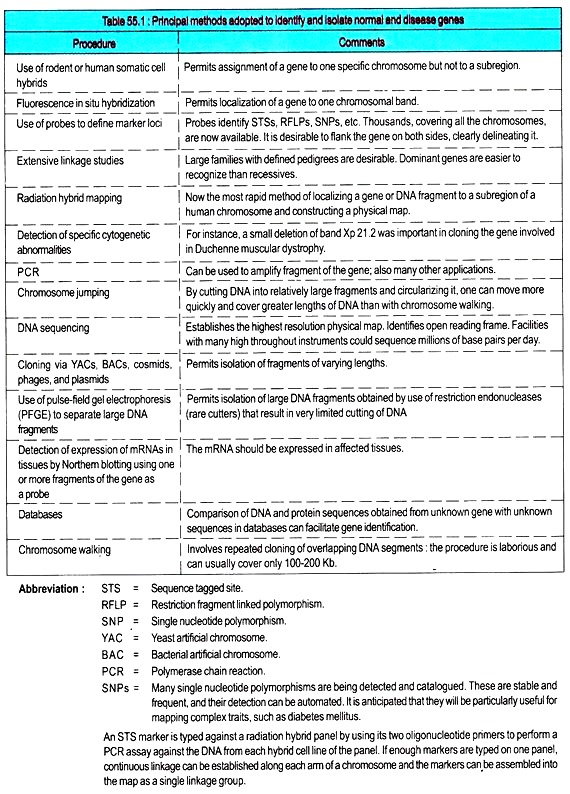The below mentioned article provides a short note on the Human Genome Project:- 1. Introduction to Human Genome Project 2. Further Work is planned on the Human and other Genomes 3. Implications for Proteomics, Biotechnology, and Bioinformatics 4. Implications for Medicine.
Introduction to Human Genome Project:
The determination of the sequences of the human genome and those of other organisms will alter biology and medicine for all time. As regards to human genome, new information on our origins, on disease genes, on diagnosis, and approaches to therapy are already being established. Progress is being accelerated in the fields of genomics, proteomics, bioinformatics, biotechnology, and the pharmacogenomics.
The Human Genome Project (HGP) is an international effort being started in 1990 whose principal goals were to sequence the whole human genome and the genome of several other organisms for the basic study of genetics.
Initially, a number of short-term goals were established for the United States effort e.g., producing a human genetic map with markers 2-5 centimorgans (cM) apart and constructing a physical map of all 24 human chromosomes with markers with spaced at about 100,000 base pairs (bP).
The following figure (Fig. 55.1) summarizes the differences between a genetic map, a cytogenetic map, and a physical map of a chromosome.
The percentages are derived from a total of 26,383 genes reported in the rough draft by Celera genomics. Classes containing more than 2.5% of the total proteins encoded by the genes identified when this rough draft was written arbitrarily listed as major.
Further Work is planned on the Human and other Genomes:
The principal task is required for filling in the gaps and identifying new genes, their locations, and functions. Regulatory regions will be identified, and the sequences of other large genomes will be obtained.
Additional SNPs will be identified; a complete catalog of these variants is expected to be of great value in mapping genes associated with complex traits and for other uses too. Existing databases will be added to as new information flows in, and new databases will probably be established to serve specific purposes. Different studies in functional genomics will also be undertaken.
Implications for Proteomics, Biotechnology and Bioinformatics:
The knowledge of the human genome will influence many regions without any doubt. Only a few are briefly discussed here.
(a) Proteomics is the study of all proteins encoded in an organism (i.e., the proteome), including their structures, modifications, functions, and interactions. In a short sense, it indicates the identification and study of multiple proteins linked through cellular actions but not the entire proteome.
(b) As regards to humans, many individual proteins will be identified and characterized; their interactions and levels will be determined in physiologic and pathologic states, and the resulting information will be entered into appropriate databases.
(c) Two-dimensional electrophoresis, mass spectrometry, and antibody arrays will be central for the expansion of this rapidly growing field.
In the long run, proteomics will highly advance our knowledge of proteins at the basic level and will also nourish biotechnology as new proteins that are likely to have diagnostic, therapeutic, and other uses are discovered and methods for their economic production are improved.
(d) Specialists in bioinformatics will be in great demand, as this field becomes strong enough to manage, analyse and utilize the flood of data from genomic and proteomic studies.
Implications for Medicine:
(a) Every area of medicine will be practically affected by the new information obtained from knowledge of the human genome. The tracking of disease genes will be sufficiently facilitated.
(b) SNP maps will greatly help in the determination of genes involved in complex diseases.
(c) Probes for any gene will be available if required, leading to improved diagnostic testing for disease genes and for genes directly involved in the causation of specific diseases.
(d) The field of pharmacogenomics is already expanding greatly and it is assumed that in the future, drugs will be tailored to accommodate the variations in enzymes and other proteins involved in drug action and metabolism found among individuals.
(e) Studies of genes involved in behaviour may lead to new insights into the causation and possible treatment of psychiatric disorders.
(f) Many ethical issues e.g., privacy concerns and the use of genomic information for commercial purposes will have to be noticed.
(g) In Third world countries it will also be vital that medical and economic benefits as regards to individuals from the effects on health services and the diagnosis and treatment of disease.



